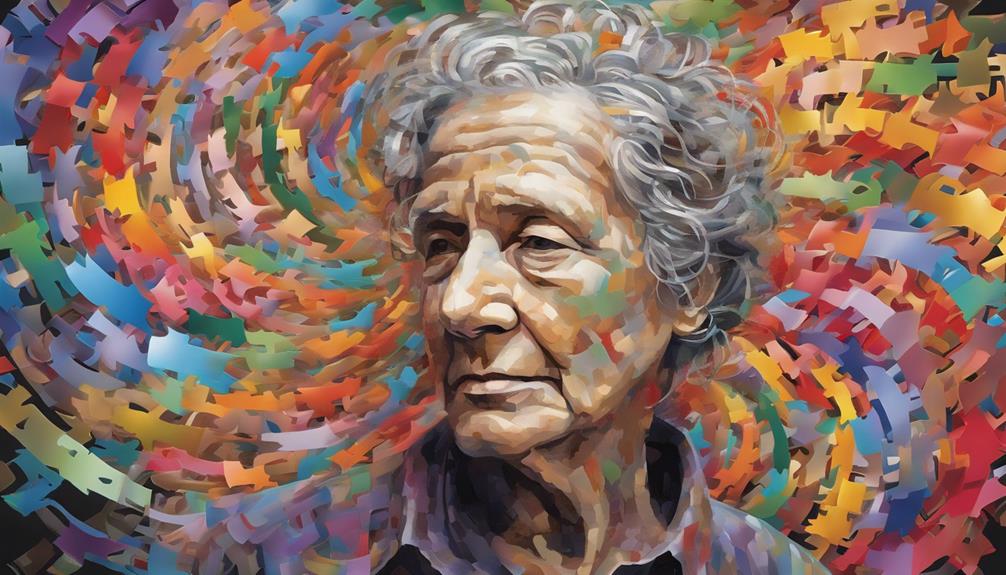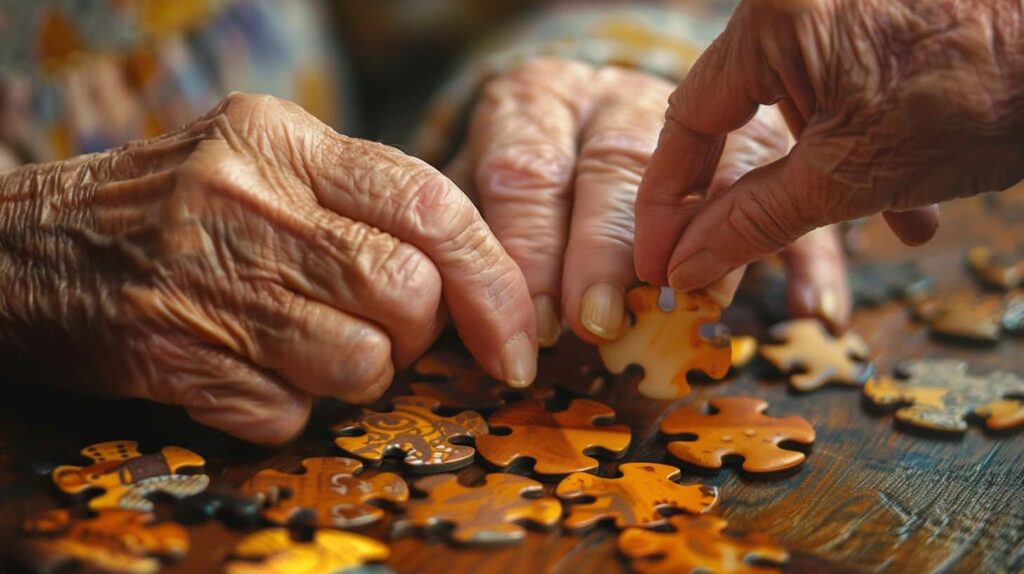
The legality of individuals with dementia signing legal documents raises intricate questions, prompting a closer examination of capacity and ethical implications.


Table of Contents

Amazon

Amazon

Amazon
When deliberating on the legality of individuals with dementia signing documents, it’s important to think about the legal and ethical issues associated with this topic.
It's a complex matter that requires careful evaluation and expert guidance to ensure the protection of the individual's rights and interests.
The nuances of mental capacity and decision-making abilities in dementia patients can raise questions about the validity of their signatures on legal paperwork.
Understanding the intersection of dementia and legal documentation is essential for making informed decisions in such delicate situations.
Understanding dementia and legal capacity is essential when navigating the complexities of signing legal documents for individuals affected by this condition. Dementia, including Alzheimer's disease, can significantly impact cognitive function, memory loss, and decision-making abilities, raising concerns about testamentary capacity when signing legal documents. Testamentary capacity refers to one's ability to understand the nature and extent of their assets, the beneficiaries involved, and the implications of signing a will.
AdvertisementIn the case of healthcare proxies, the individual must comprehend the purpose and outcomes of appointing a proxy to make medical decisions on their behalf.
Navigating the legal landscape with dementia requires a nuanced understanding of guardianship laws, the role of attorneys, and the importance of seeking both legal and medical advice. Assessing an individual's legal capacity involves evaluating their ability to comprehend the consequences of signing a document at a specific time, considering potential cognitive fluctuations.

Dementia's impact on legal competency can present complex challenges in assessing an individual's capacity to understand and sign important documents. When dealing with dementia patients, signs of dementia such as memory loss, confusion, and difficulty with decision-making can affect their ability to demonstrate testamentary capacity required for signing legal documents. Legal competence in individuals with dementia may vary, emphasizing the need to evaluate their capacity at the specific time of document execution. Physician verification becomes crucial in cases of dementia to ensure the individual possesses the mental capacity necessary for signing legal documents. In situations where dementia impairs one's ability to sign legal documents, guardianship proceedings may be initiated to safeguard their interests through court intervention. Below is a table illustrating the interplay between dementia and legal competency:
| Aspect | Implications |
|---|---|
| Testamentary Capacity | Understanding and decision-making skills |
| Physician Verification | Ensuring mental capacity for signing |
| Guardianship | Court intervention for protection |

When ensuring the legal well-being of individuals with dementia, it is crucial to establish safeguards that verify their cognitive abilities and understanding before signing any documents. Safeguards play a vital role in protecting individuals with dementia from potential exploitation or misunderstandings regarding legal matters. One essential safeguard is to assess the individual's mental capacity through consultations with healthcare professionals to ensure they have the necessary cognitive abilities to comprehend the implications of signing legal documents. Additionally, ensuring that the individual fully understands the nature of the documents they are signing is equally important. Here is a table highlighting key safeguards for individuals with dementia signing legal documents:
| Safeguard | Description | Importance |
|---|---|---|
| Physician Assessment | Evaluating cognitive abilities and mental capacity through medical consultations. | Ensures competence |
| Legal Guidance | Seeking advice from experienced attorneys to navigate the complexities of legal documents. | Provides clarity |
| Understanding | Confirming that the individual comprehends the implications and consequences of signing the document. | Ensures informed consent |
Seeking legal guidance for documents related to dementia is paramount in ensuring the proper handling of complex legal matters concerning individuals with cognitive impairments. When dealing with a loved one with dementia, it's crucial to make informed decisions, especially in areas such as estate planning and power of attorney.
To navigate this challenging terrain, consider the following:
AdvertisementWhen discussing legal consent for someone with dementia, it's important to consider their cognitive abilities and understanding. Dementia can impact a person's capacity to give informed consent due to cognitive fluctuations.
Seeking advice from legal and medical professionals is crucial in assessing this capacity. Understanding the individual's ability to comprehend legal implications is essential in determining if someone with dementia can legally consent.
It's a complex issue that requires careful evaluation and consideration.
We've seen dementia's impact on legal decisions, fluctuating capacity is crucial. Assessment at signing is key. When understanding remains, signing may be possible.
Physician verification aids doubt. If capacity lacks, guardianship may be needed.
When someone has dementia, the validity of a Power of Attorney may be impacted. Dementia can affect one's understanding and decision-making abilities, potentially raising questions about legal capacity.
AdvertisementTo ensure that a Power of Attorney is valid, seeking advice from legal and medical professionals is crucial. Assessing the individual's mental capacity with the help of a physician can provide clarity on the document's legitimacy.
Proper guidance and support are essential in such situations.
When caring for a loved one with dementia, it's essential to approach interactions with patience and understanding. Rushing or pressuring them can heighten confusion and anxiety. Never argue or correct them, as it may lead to frustration.
Additionally, avoid asking complex questions that could be challenging for them to answer. By following these guidelines, we can create a compassionate and supportive environment that respects their dignity and wellbeing.
In conclusion, when it comes to individuals with dementia signing legal documents, it's like playing a game of legal roulette. With fluctuating mental capacity and potential risks of exploitation, it's a delicate dance between protecting their rights and safeguarding their interests.
AdvertisementSeeking guidance from legal and medical professionals is crucial to navigate this complex terrain with care and compassion. Remember, in the legal world of dementia, it's better to be safe than sorry.

Kensington VeriMark USB Fingerprint Key Reader - Windows Hello, FIDO U2F, Anti-Spoofing (K67977WW),Black
Amazon

USB Fingerprint Reader Mini Fingerprint Scanner PC Dongle Windows Hello Fingerprint Reader for PC Laptop 360 Degree Touch Speedy Matching Biometric Portable USB Fingerprint Logger for Windows
Amazon

Amazon
Albert brings a wealth of knowledge and expertise to our writing team. With a background in caregiving and a deep understanding of the challenges faced by caregivers, Albert’s writing resonates with authenticity and empathy. He is committed to delivering high-quality content that empowers and supports caregivers on their journey.
Related Topics:Fast Ways to Assess Dementia: The Scale You Need
What Dementia Stage Leads to Not Bathing?


Advertisement
Intrigued by the profound symbolism and emotional depth, delve into the world of dementia tattoos to uncover their hidden meanings and powerful impact.


Table of Contents

Tattoo Gun Kit Cartridge Tattoo Machine Kit Tattoo Kit Tattoo Pen Kit for Beginners Rotary Tattoo Pen Type Machine Kit Complete Tattoo Supplies WTK070
Amazon
 Long Lasting Flower Temporary Fake Tattoos For" />
Long Lasting Flower Temporary Fake Tattoos For" />
Bilizar 64 Sheets Long Lasting Flower Temporary Fake Tattoos For Women Arm Neck, Jellyfish Sunflower Moon Rose For Adults Girl, 3D Temp Realistic Snake Tatoo Stickers Serpent Peony Floral Kids
Amazon

Amazon
As we navigate the intricate paths of displaying solidarity and remembrance, it is difficult not to ponder why an increasing number of people are opting for dementia tattoos. These tattoos tell stories that transcend language, weaving a tapestry of emotions and support to raise awareness about Alzheimer’s.
But what lies beneath the surface of these intricate designs goes beyond mere aesthetics; there's a deeper connection waiting to be uncovered, a connection that resonates with both the wearers and observers, beckoning us to explore further into the intricate realm of symbolism and support.
Dementia tattoos have been increasingly embraced as a poignant symbol of memory loss and a means to raise awareness about Alzheimer's disease. For many, these tattoos represent more than just ink on skin; they hold a deep significance. Choosing a dementia tattoo for a loved one with Alzheimer's means something profound – it's a visible display of unwavering support and a constant reminder of the cherished memories shared.
The popularity of dementia tattoos reflects a growing understanding of the emotional impact of Alzheimer's on both patients and caregivers. These tattoos serve as a powerful connection point, sparking conversations and fostering empathy. Through these tattoos, individuals find solace in honoring their loved ones and expressing solidarity with others facing similar challenges. Each stroke of the tattoo needle is a testament to the enduring bond between individuals and their loved ones affected by Alzheimer's.

In providing practical information and medical details regarding tattoos associated with memory loss, it is essential to understand the significance and potential implications of these artistic expressions. Dementia tattoos, often featuring forget-me-not flowers, serve as poignant symbols of memory loss and are significant in raising awareness about Alzheimer's disease. Caregivers frequently choose these tattoos as a heartfelt way to express love and support for their loved ones affected by dementia. These tattoos not only act as a reminder to cherish memories but also serve as conversation starters about dementia and Alzheimer's, fostering connections and honoring those impacted by the disease.
| Information | Details |
|---|---|
| Tattoo Safety | Ensure proper hygiene and sterile equipment for tattoo placement. |
| Skin Sensitivity | Individuals with skin conditions should consult a dermatologist. |
| Tattoo Removal Consideration | Reflect on the permanence of tattoos and potential removal options. |
As caregivers and loved ones of individuals impacted by memory loss, we witness firsthand the profound impact that dementia tattoos have on fostering understanding and solidarity within our community. These tattoos serve as more than just ink on skin; they represent a deep connection to those battling Alzheimer's and other forms of dementia. Seeing a loved one adorned with a dementia tattoo is a powerful reminder of the challenges they face daily, sparking empathy and compassion in our hearts.
AdvertisementThe symbolic nature of these tattoos not only honors the struggles of our loved ones but also unites us in a shared mission to raise awareness and support those affected by memory loss. By wearing these tattoos, we demonstrate our commitment to standing by our loved ones through their journey with dementia. It's a visible sign of our unwavering support and love, a reminder to cherish every moment and advocate for better resources and research in the fight against Alzheimer's disease.

Starting conversations and raising awareness about memory disorders through dementia tattoos featuring symbolic forget-me-not flowers is a powerful way to honor loved ones and foster meaningful connections within the community. These tattoos, chosen by caregivers to showcase love and support while shedding light on Alzheimer's, serve as poignant conversation starters. By wearing these tattoos, individuals not only pay tribute to those affected by memory loss but also spark discussions that can lead to increased understanding and support for dementia research.
Dementia tattoos act as constant reminders to cherish memories and offer unwavering support to those battling Alzheimer's. The symbolic forget-me-not flowers serve as a beacon of solidarity with caregivers and patients, creating a sense of unity within the community. These tattoos play a crucial role in breaking the silence surrounding memory disorders, encouraging open dialogue, and fostering empathy towards individuals impacted by Alzheimer's. Through these powerful symbols, we can come together to raise awareness, offer compassion, and stand as allies in the fight against dementia.
Considering personalized designs and symbols of personal significance, dementia tattoos offer a unique way to honor memories and raise awareness about memory-related disorders.
Yes, there's a symbol for dementia. It represents the challenges of memory loss and the importance of remembrance.
This symbol serves as a reminder of the impact of Alzheimer's disease on individuals and families. It highlights the need for understanding and support for those affected by dementia.
AdvertisementThis symbol can spark conversations and advocacy for research into memory disorders.
When it comes to tattoos representing dementia, a powerful symbol that resonates with many is the forget-me-not flower. This delicate bloom encapsulates the essence of memory loss and Alzheimer's awareness, serving as a poignant reminder of the impact of dementia on individuals and their loved ones.
The forget-me-not tattoo not only symbolizes love and support but also encourages conversations about this challenging disease and the importance of cherishing memories.
We often see a quote used for dementia tattoos, 'I will remember for you,' signifying the act of remembering on someone's behalf. This phrase beautifully captures the essence of support and empathy for those facing memory loss.
It's a touching way to show love, understanding, and solidarity with individuals affected by Alzheimer's. The quote symbolizes the importance of cherishing memories and honoring those struggling with dementia.
AdvertisementForget-me-not flowers symbolize dementia awareness, representing memory loss and remembrance. These flowers are often chosen to raise awareness about Alzheimer's disease.
Caregivers may select dementia tattoos featuring forget-me-nots to express love and support. These tattoos serve as a reminder to cherish memories and advocate for dementia research.
Drawing attention to memory disorders, forget-me-not flowers in tattoos initiate conversations and help build connections within the community.
Dementia tattoos serve as thoughtful gifts for Alzheimer patients, symbolizing love and memory. These tattoos can be a permanent reminder of cherished moments or a way to honor a loved one’s name. They provide comfort and a tangible connection, creating a powerful symbol of affection for those affected by Alzheimer’s.
As we reflect on the significance of dementia tattoos, it's important to note that over 50 million people worldwide are currently living with dementia, a number that's expected to triple by 2050.
AdvertisementThese tattoos not only serve as beautiful symbols of love and support but also play a crucial role in raising awareness and igniting important conversations about Alzheimer's disease.
Let's continue to stand in solidarity with those affected and advocate for better care and research.

Blank Tattoo Practice Skin, Gospire 10pcs 8x6in Practice Skin Tattoo Skin Practice Sheet for Beginners and Experienced Artists (Rubber Type)
Amazon

LabAider 6Pcs Professional Surgical Tip Skin Marker Pen Sterile Tattoo Stencil Markers Pen with Paper Ruler for Eyebrow, Lips - Individually Wrapped (0.5MM&1MM)
Amazon

Amazon
Albert brings a wealth of knowledge and expertise to our writing team. With a background in caregiving and a deep understanding of the challenges faced by caregivers, Albert’s writing resonates with authenticity and empathy. He is committed to delivering high-quality content that empowers and supports caregivers on their journey.
Yearning for solace in the labyrinth of fading memories, 'Dementia Poem' invites you to unravel the profound tapestry of emotions waiting to be discovered.


Table of Contents

Amazon

Amazon

Amazon
In a world where memories fade as quickly as leaves in autumn, we have come across a powerful piece that deeply resonates with the soul. The combination of words in ‘Do Not Ask Me to Remember’ encourages us to explore the deep realms of emotional connections and the human spirit, even in the face of relentless grip of dementia.
As we journey through the labyrinth of verses, we uncover a treasure trove of insights waiting to be unearthed, offering a glimpse into the profound impact of poetry on the human spirit.
Exploring the intricacies of crafting dementia poems reveals a profound journey of empathy and understanding. Within the walls of a care home, where every heartbeat echoes a story of resilience, dementia poems serve as windows into the souls of those affected by memory loss. Caregivers, amidst the challenges and joys, find solace in the verses that speak of their unwavering love and dedication. Through the lens of poetry, the complexities of navigating life with dementia are laid bare, highlighting the importance of patience and compassion in every interaction.
In the quiet moments shared between caregivers and residents, poetry becomes a bridge connecting past and present, weaving a tapestry of shared memories and emotions. The care home transforms into a sanctuary where words carry the weight of unspoken feelings, offering comfort and understanding to all who dwell within its walls. As poets craft verses that echo the humanity present in every caregiving journey, they illuminate the path towards a future filled with empathy and grace.

Delving into the realm of dementia caregiving through poetry offers a poignant avenue for expressing intricate emotions and navigating the complexities of this journey with grace and understanding. Poetry serves as a heartfelt medium to articulate the myriad of feelings that arise in the realm of dementia care.
These poems provide a raw and authentic glimpse into the emotional rollercoaster that comes with looking after loved ones with dementia. Through verses that echo personal insights and reflections, individuals can share their coping mechanisms and shed light on the profound impact dementia has on relationships.
AdvertisementThe poems often underscore the significance of love, patience, understanding, and the dire need for support in the challenging terrain of dementia care. By encapsulating these experiences in poetic form, caregivers not only find solace in their expression but also create a platform for raising awareness, fostering empathy, and forging connections with others walking similar paths in the realm of dementia care.

Finding solace in poetic verses, individuals touched by dementia can often discover a sense of understanding and connection amidst the challenges they face. I've always found that poetry has this incredible ability to convey emotions and experiences in a way that resonates deeply with the heart. When it comes to dementia, these verses become even more poignant, offering a glimpse into the complex world of those living with the condition and their caregivers.
I've always believed that poetry has a unique power to provide comfort and healing during difficult times. The emotional insights shared through dementia poems help us navigate the rollercoaster of emotions that come with caregiving. They remind us of the importance of love, patience, and empathy in supporting individuals with dementia. Through these verses, we can better understand the impact of dementia on relationships, memories, and communication, fostering a greater sense of awareness and compassion for those affected by this challenging condition.
In the realm of dementia, where communication can be complex and emotions intense, finding solace and empathy in the power of poetic words can offer a beacon of light and understanding in the midst of uncertainty.
We understand the impact of dementia on relationships and memories. It challenges us to navigate through the emotions and coping mechanisms.
AdvertisementRaising awareness and involving youth is crucial for understanding dementia.
We've experienced the emotional journey of caring for loved ones with dementia. It's a poignant reminder of the importance of empathy and support for those affected by this condition.
We've learned that the average age of death for someone with dementia is typically around 80 years old.
It's essential to remember that individuals with dementia often have a shorter life expectancy due to complications like infections and falls.
Factors such as the type of dementia, overall health, and access to quality care can influence their age of death.
AdvertisementCaregivers play a crucial role in providing support and ensuring a dignified end-of-life experience for those with dementia.
Sundowning is a symptom of mid to late-stage dementia. It often brings increased agitation, confusion, and behavioral changes in the late afternoon or evening. Though the exact cause isn't fully understood, disruptions in the body clock or changes in brain function may play a role.
Caregivers can help manage sundowning by maintaining a consistent routine, reducing noise and stimuli in the evening, and creating a soothing environment for those with dementia.
Dementia poems and meaningful dementia tattoos symbolizing love can be powerful ways to express emotions and memories. Both can serve as a tangible reminder of love and connection, providing comfort and a sense of continuity for those coping with the challenges of dementia.
As we reflect on the power of dementia poems like 'Do Not Ask Me to Remember,' we're reminded of the deep emotional journey faced by those affected by Alzheimer's disease. Through the art of poetry, we can express complex emotions, raise awareness, and find solace in shared experiences.
AdvertisementCan words truly capture the essence of love, patience, and understanding needed to support individuals living with dementia? Let's continue to embrace empathy and compassion in our caregiving journey.

Amazon

Amazon

Amazon
Albert brings a wealth of knowledge and expertise to our writing team. With a background in caregiving and a deep understanding of the challenges faced by caregivers, Albert’s writing resonates with authenticity and empathy. He is committed to delivering high-quality content that empowers and supports caregivers on their journey.


Table of Contents

Amazon

Amazon

Amazon
Assisted living and memory care facilities provide safe and secure environments for older adults with dementia, offering a combination of housing, personal care, and medical services. Designed to meet the varying care needs of individuals at various stages of dementia, these communities focus on enhancing quality of life. They establish environments that aim to minimize confusion and empower residents to maintain their independence.

The decision to move a loved one into assisted living or memory care is a significant one, fraught with emotional and practical challenges. Understanding the care needed and the services these communities provide is the first step in making an informed choice. Families must recognize the signs that indicate it’s time to consider assisted living, including changes in behavior, safety concerns, and the increasing difficulty of managing daily tasks.
Assisted living and memory care communities offer specialized programs and therapies to support cognitive health and provide sensory stimulation. From music therapy to arts and crafts, these activities are tailored to meet the needs and abilities of seniors with memory issues. By engaging residents in these therapeutic activities, communities aim to slow cognitive decline and improve the overall well-being of their residents.

Choosing the right community involves weighing factors such as the level of care provided, the cost, and the facility’s amenities. Families must consider both the current and future needs of their loved one, ensuring that the community can adapt to changing care requirements. With the right support and resources, families can navigate the journey of dementia care with confidence, knowing their loved one is in good hands.
Dementia care in assisted living communities focuses on supporting residents through various stages of dementia. Staff training is geared towards understanding cognitive decline and providing care that addresses the unique needs of seniors with memory issues. From ensuring safety to offering music therapy, these communities strive to enhance cognitive abilities and minimize confusion. The goal is to create a supportive environment that respects each loved one’s individuality and promotes their well-being.
Assisted living and memory care communities serve as a cornerstone for families navigating the challenges of dementia. They offer a helping hand to residents who need assistance with daily activities while maintaining a focus on memory care. Memory care neighborhoods within these communities are designed to cater to individuals with various forms of dementia, providing a secure and supportive environment that fosters a sense of normalcy and well-being.
Assisted living communities prioritize the safety and security of seniors with memory issues. They implement measures to minimize confusion and ensure residents’ well-being. This includes controlled entrances and exits to prevent wandering, a common concern among those with dementia. The layout and design of these communities are carefully considered to create a secure environment that promotes independence while safeguarding residents.
Advertisement
Additionally, these communities are equipped with emergency response systems and staff trained to respond to the unique needs of seniors with memory impairments. The aim is to provide a safe space where residents can live with dignity and receive the care they need. Through these safety measures, assisted living communities strive to offer peace of mind to families and a secure home for their loved ones.

Supporting residents in assisted living and memory care facilities requires a compassionate and knowledgeable workforce. Staff training focuses on understanding the complexities of dementia and delivering person-centered care that respects each resident’s individuality. Caregivers at memory care facilities are equipped with the skills needed to address the challenges of memory loss, ensuring that residents receive the support they need to navigate their daily lives.
“Memory care communities” adopt specialized care approaches that cater to the unique needs of those living with dementia. This includes therapeutic activities designed to stimulate cognitive abilities and promote emotional well-being. From art therapy to reminiscence sessions, these activities provide meaningful engagement and foster a sense of community among residents. Through dedicated staff and targeted care strategies, assisted living and memory care facilities aim to enhance the quality of life for their residents.
When it comes to covering the costs of memory care for a person living with advanced memory conditions, family members often find themselves navigating a complex landscape of financial planning. As dementia progresses, the need for specialized senior care intensifies, pushing families to explore various payment options to ensure their loved ones receive the necessary care without draining their financial resources.

One of the first steps for family members is to understand the insurance coverage the person living with dementia has. Many assisted living communities and memory care units accept long-term care insurance, which can significantly offset the costs of advanced memory care. Additionally, health insurance, including Medicare, may cover some aspects of care, particularly if skilled nursing or rehabilitative services are required. It’s crucial to review the policy details and consult with insurance providers to grasp the extent of coverage.
Beyond insurance, there are other avenues to explore. Veterans benefits can be a substantial help for families of seniors living with dementia who served in the military. These benefits often cover a portion of the costs associated with memory care units situated within senior living communities. Furthermore, some families opt for reverse mortgages or utilize life insurance policies’ living benefits feature to fund dementia care. Each option has its considerations and potential impacts on a family’s financial health, making it essential to consult with financial advisors who specialize in senior care planning.

Choosing the right assisted living community that offers specialized memory care is critical for family members. It involves evaluating whether a facility can provide a safe, engaging, and supportive environment specifically designed for adults living with Alzheimer’s disease or other dementia forms.
The selection process should prioritize communities that demonstrate a deep understanding of dementia care needs and offer personalized care plans to address the unique challenges each resident faces.
For family members, finding a balance between independence and personal care for their loved ones can be challenging. Memory care units within assisted living communities offer a promising solution. These units provide an environment specifically tailored for seniors living with dementia, combining personal care assistance, advanced memory therapies, and structured daily activities. This integrated approach ensures that as dementia progresses, residents receive the level of care needed to maintain their quality of life. Furthermore, amenities like chef-prepared meals and therapeutic activities contribute to a fulfilling living experience.
Advertisement
When comparing assisted living communities, it’s essential to look beyond the surface and evaluate the depth of dementia care provided. Key factors include the availability of nursing homes within the community for more advanced care needs, the approach to medication management to ensure residents’ health and safety, and the variety of daily activities designed to engage residents and promote cognitive health. These elements collectively contribute to the overall effectiveness of dementia care programs.
Moreover, the staff’s expertise in dementia care and their ongoing training to stay updated with the latest care approaches can significantly impact the quality of life for residents. Facilities that prioritize a high staff-to-resident ratio and specialized training for their team members often stand out for their superior care and support for individuals living with dementia.

Families often have many questions when considering assisted living dementia care options. Common inquiries revolve around the types of care provided, the costs involved, and how to ensure their loved one will receive the attention and support they need. Addressing these questions is essential for making informed decisions and finding the best care solution for individuals living with dementia.
Navigating the journey of dementia care requires a comprehensive strategy that includes understanding the care needs of the person living with dementia, researching available senior care options, and establishing a robust support system.
Assisted living communities and specialized memory care units play a crucial role in this strategy by offering environments designed to enhance the quality of life for individuals with dementia. These settings provide tailored care plans, specialized activities, and therapies aimed at slowing the progression of dementia and maintaining cognitive functions for as long as possible.

Additionally, support from other family members, dementia care professionals, and caregiver support groups can provide the emotional and practical assistance needed to manage the challenges of dementia care. Together, these resources form a comprehensive support system that enables families to navigate the complexities of dementia care with greater confidence and resilience.
Enhancing the quality of life for adults living with Alzheimer’s disease and other forms of dementia is at the heart of effective dementia care. This involves creating a supportive and stimulating environment that addresses the physical, emotional, and social needs of individuals with dementia. Assisted living communities strive to promote well-being and happiness among their residents through personalized care plans, engaging activities, and compassionate caregiving.
In dementia care, activities and therapies are tailored to engage residents and promote cognitive health. These programs stimulate memory, improve communication skills, and encourage social interaction. By participating in various activities, residents can experience joy and fulfillment, contributing to an overall sense of well-being and quality of life.
Advertisement
Assisted living communities and memory care units employ a variety of activities and therapeutic approaches to engage residents and support cognitive health. These may include music therapy, art classes, physical exercise, and memory games.
Such activities are not only enjoyable but also serve to stimulate cognitive functions and foster social connections among residents. Tailoring these activities to individual interests and abilities ensures that each resident can participate fully and benefit from the therapeutic effects.

Beyond organized activities, everyday interactions and routines also play a significant role in promoting cognitive health. Staff members are trained to engage residents in meaningful conversations, assist with personal care tasks in ways that encourage independence, and create a welcoming and inclusive community atmosphere. This holistic approach to care supports the cognitive and emotional well-being of individuals living with dementia.
Creating a supportive community environment is crucial in specialized memory care. Such an environment fosters a sense of belonging and security for residents, allowing them to thrive despite the challenges of living with dementia. By emphasizing personalized care, respect, and inclusion, assisted living communities help residents maintain their dignity and enhance their quality of life.
Strong relationships between caregivers and residents are central to the success of dementia care. These relationships are built on trust, empathy, and a deep understanding of each resident’s unique needs and preferences. Caregivers who take the time to know their residents can provide more personalized care, which significantly impacts the residents’ sense of well-being and happiness.

Moreover, fostering connections among residents themselves is equally important. Social interactions and friendships within the community can offer emotional support, reduce feelings of isolation, and contribute to a vibrant and engaging living environment. Through shared activities and communal spaces, residents have opportunities to form meaningful relationships, enriching their daily lives.
As families consider memory care options, planning for the future becomes a priority. This involves evaluating the potential need for skilled nursing care as Alzheimer’s disease or other forms of dementia progress. Understanding the available care approaches and the qualifications of specially trained staff members in various senior living communities can help families make informed decisions that align with their loved one’s needs.
It’s also essential for families to consider the financial aspects of long-term dementia care. The critical steps in financial planning are to explore payment options, understanding the services included in a care plan, and considering the potential for changing care needs over time. This proactive approach allows families to prepare for future care needs without compromising the quality of care their loved ones receive.
AdvertisementConsidering memory care options for a loved one involves carefully evaluating their current and future care needs. Families should seek communities that offer a continuum of care, from independent living to more intensive personal care, ensuring a smooth transition as their loved one’s needs evolve. Utilizing informational resources and consulting with senior living advisors can provide valuable insights and support throughout this decision-making process.
Engaging in open and honest conversations with your loved one about their care preferences and concerns is vital. This dialogue should be ongoing, adapting as needs and circumstances change. Listening to their wishes and involving them in decision-making processes as much as possible helps ensure that the care plan aligns with their desires and values.

Additionally, educating oneself about the stages of Alzheimer’s disease and the associated care needs can help families navigate the journey with empathy and understanding. By staying informed and maintaining open communication, families can work together to select the best memory care option, creating a supportive and loving environment for their loved one.
Making decisions about assisted living dementia care can be challenging for families, but understanding the options available can significantly ease this process. A guide to assisted living offers a comprehensive overview of what families can expect, including details on levels of care, which are crucial as the person with dementia progresses through the stages of the disease. By equipping families with knowledge, the journey of selecting the right assisted living facility becomes less daunting and more empowering.
When considering the best environment for a loved one, it’s important to recognize that facilities vary in the services they provide. Some offer around-the-clock care, ideal for seniors who require constant support, while others might focus more on engaging activities that promote mental health and cognitive function. The choice should align with the specific needs of the person with dementia, considering their current health status and anticipated needs as the disease advances.
Lastly, the Department of Health in many regions provides guidelines and resources for families seeking nursing care options for dementia patients. These resources can help families understand the regulatory standards for assisted living facilities, ensuring that the chosen community meets the required safety, care, and quality standards. By staying informed and considering all aspects of care, families can make confident decisions that enhance the well-being of their loved ones in the difficult journey of dementia.